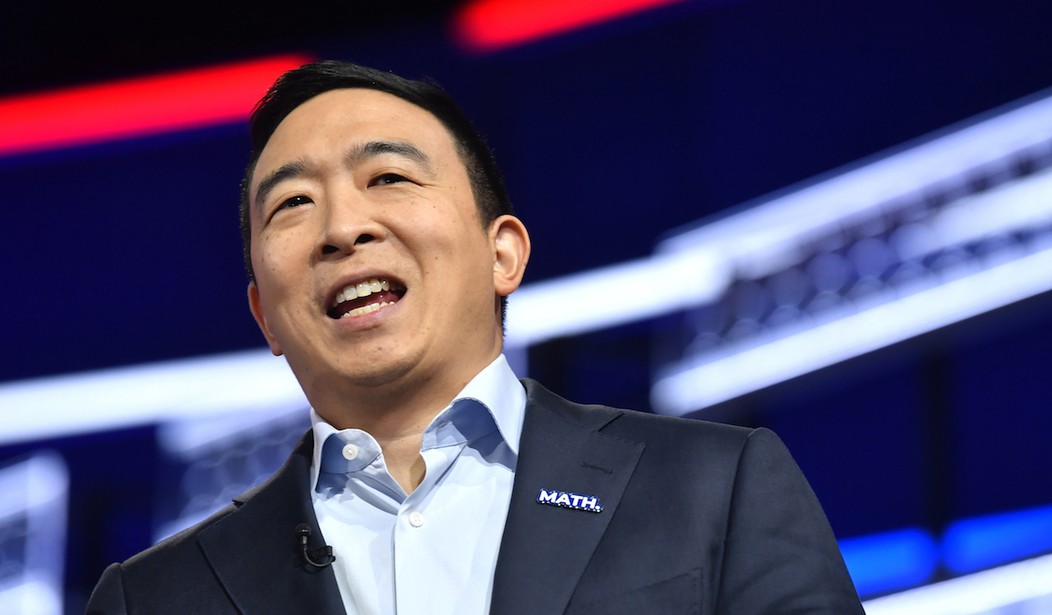Democratic presidential candidate Andrew Yang is on to something: Americans could use a big "freedom dividend" -- that is, a guaranteed source of income on which they can rely month after month, free from the uncertainties of the job market and employment. But like many Democrats' ideas, Yang's otherwise brilliant insight is corrupted by an ideology that strangely sees the government as the engine of wealth creation and distribution.
Yang's plan to provide a universal basic income of $1,000 per month to every American over age 18 sounds pretty good. All that money could go toward education, health care, job retraining or even housing assistance for everyday Americans. It also could be wasted with mindless consumer spending on things like clothing, electronics or even drugs.
Yes, average American families need more money. But what they do not need is yet another government bureaucracy that will tax and administer this so-called dividend, which would really be a loan. America is sinking under the weight of financial obligations that have burgeoned over the years from a commonsense approach to helping aging citizens -- Social Security and Medicaid -- into a gargantuan system of bureaucracy and debt our nation no longer can afford.
In fact, entitlement spending has become so politically sacrosanct that even modest attempts to reform the system by, for example, enacting sliding age requirements to Social Security based on the increasing life expectancy of retirees, have been met with howls of opposition. Once someone believes the government "owes" them something, it creates a sense of ownership and entitlement -- and, ultimately, dependency -- that prevents them from making rational choices about how to work, how to save and how to make healthier choices that ultimately could reduce the need for catastrophic health care.
Recommended
A better idea would be for Americans to create their own dividend by working hard, saving and ultimately investing their money in a way that provides them with a constant income. For example, about $240,000 invested at a relatively "safe" rate of 5% per year -- achievable without incurring undue investment risk -- would provide a dividend of about $12,000 per year. But more importantly, the work and discipline it would require for the average person to save that amount would provide far more personal security than a government handout. Furthermore, the productive capacity that it would take to earn over $200,000 would greatly aid our nation in terms of overall economic growth.
Contrary to popular belief, and even current Federal Reserve policy, government money does not grow on printing presses. It comes from taxes paid by workers and businesses on their earned income. If people are disincentivized to work because of a guaranteed handout from the government, there will be fewer people available to actually pay the tens of billions of dollars in new taxes it would take to fund this new entitlement Yang envisions.
Proponents claim that guaranteeing basic income would create an economic multiplier that could grow GDP. "Overall, the cost of the freedom dividend will be offset by new revenue, fiscal savings and economic growth. Areas where we'll see fiscal savings include the reduction of health care costs, lower incarceration rates, reduced homelessness and bureaucratic downsizing. Additionally, the freedom dividend will boost GDP, increase consumer spending, create jobs and lead to more tax revenue," claims S.Y. Lee, national press secretary for the Yang campaign.
It's obvious that Lee's argument rests on a sleight of hand. What proponents of universal basic income claim is that when the government actually gives people money, it saves what it would have to spend down the line curing the ills of poverty -- bad health, incarceration and government assistance in other forms. But this rests on a major assumption: that the government should be in the business of providing expensive social services in the first place.
Government health care, for example, has proven to be a major fiasco in this country. Despite spending more on health care than any other country -- more than $1 trillion in 2018 -- American health outcomes, including life expectancy, have declined in recent years. More importantly, our "health span," or the amount of time people can maintain healthy, productive lives, has declined in the age of massive health care bureaucracies fed by government spending.
A real American freedom dividend would involve putting in place pro-business policies, such as deregulation and lowering taxes, and labor market policies, such as reducing illegal immigrant labor competition. These policies do not require the government to spend a thing -- or require it to spend less -- while at the same time removing barriers to employment and economic growth. Investing in business and job growth produces actual dividends, not, like Yang's proposal, tens of billions of dollars of new government debt.

























Join the conversation as a VIP Member